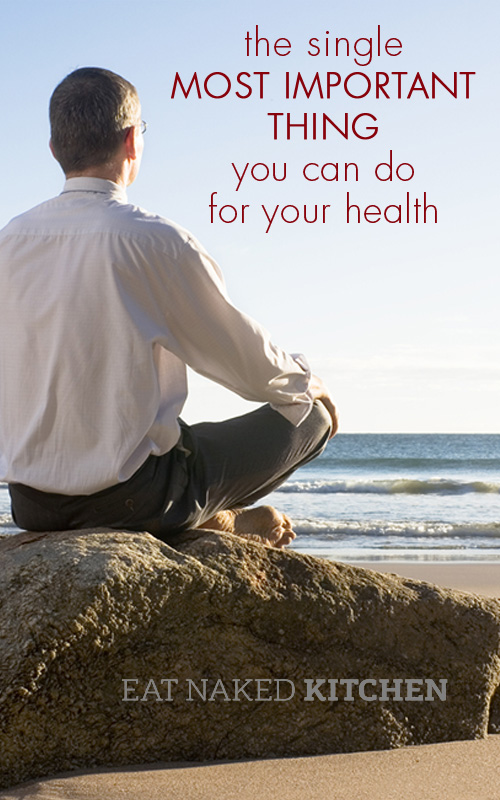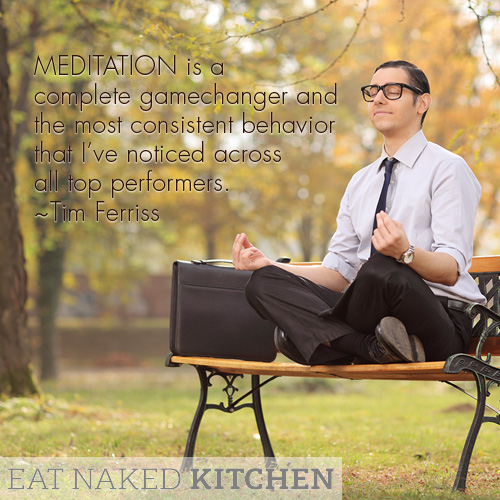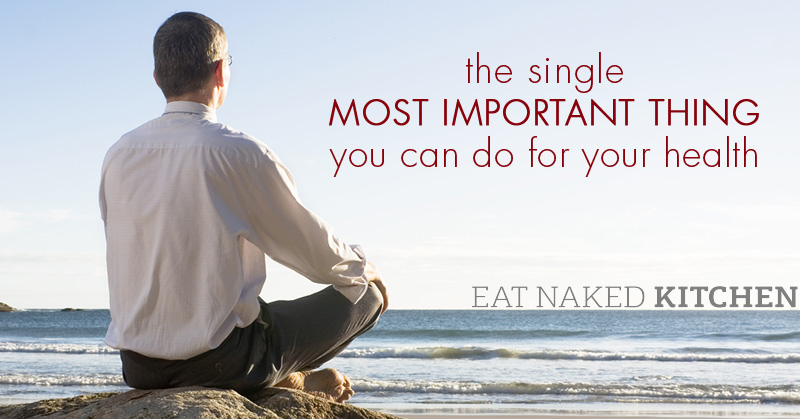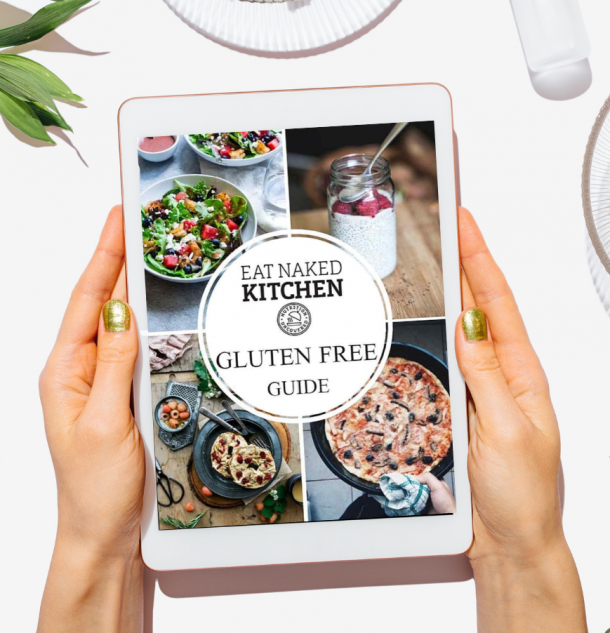What if I told you that there is ONE simple change you can make right now that will have a massive impact on your health and, for that matter, on your life overall. Would you do it?
What if I told you that this ONE change has nothing to do with food or your diet. Would you do it?
What if I told you that this ONE change isn’t about how you move your body in anyway. Would you do it?
Can you guess what it is?
Let me give you a hint – it has to do with managing and mitigating the single most important underlying factor to all health issues: stress.

You got it! It’s meditation.
Now, I need to be really upfront with you before I go any further. I am NO expert in meditation. I have only being meditating regularly for a few months (at the point of this writing, it’s been 4 months almost to the day) and I am not trained in any particular form of meditation, let alone an expert at any of it.
But I do have this: the profound experience of making only this one single change and watching what happens.
Despite my brief experience with the act of meditation, I have a long history of false starts and trying to figure out how to bring meditation into my life. I’m sure at this point most of us are aware of the benefits of meditation, at least on some level. Here’s a short and incomplete list just to give you an idea:
- Decreases stress, anxiety and depression
- Boosts immune function
- Decreases pain and inflammation
- Increases memory and improves focus and attention
- Increases capacity for emotional regulation and self-control
- Increases overall happiness and life satisfaction

And that’s just the tip of the iceberg. Best-selling author and entrepreneur Tim Ferriss calls it “a complete game changer” and “the most consistent behavior that I’ve noticed across all the top performers that I interview for this podcast.” [For those of you who don’t know Tim, I highly recommend his podcast. He interviews top performers in a huge variety of fields to see what behaviors allow them to excel at such a high level. You’ll find a ton of gems on health, lifestyle, mindset, creativity and business. It’s the only podcast I listen to regularly.]
But back to meditation…
I’ve known that I *should* meditate for years – but actually bringing that practice into my life has completely befuddled me until recently. And now that I’m actually doing it, I am a total and complete convert.
You see, I can be a little stress-bucket. If worrying were a profession, I’d be top of the field. My pattern goes something like this:
“It’s all good… we’re fine…”
“It’s all good… we’re fine…”
“It’s all good… we’re fine…”
“HOLY MOTHER OF GOD IT’S ALL HORRIBLE, THE WORLD IS CRASHING DOWN, MY WHOLE LIFE IS FALLING APART, WHO AM I TO EVEN GET OUT OF BED IN THE MORNING?? I SHOULD JUST LEAVE NOW BEFORE ANYONE REALIZES WHAT A COMPLETE AND UTTER DISASTER I AM AND I CAUSE TO THE WORLD AROUND ME…” You get the picture. I put Chicken Little to shame. (And God bless my husband’s patience with me in these moments!)
Being in the health profession, I know only too well the debilitating effects of stress on our bodies. It:
- Compromises all “non-essential” functions like digestion and healing
- Increases cholesterol, blood pressure, heart rate, triglycerides, insulin levels and cortisol production
- Puts you in fat-storage mode
- Inhibits immune function
- Shrinks your perception of time – so you feel even more panicky
And these are just the physiological impacts. Not to mention the fact that for most of us, it shuts down our creative thinking and shifts our brains into that animal-instinct survival mode. It’s exhausting.
This stress state is not our “optimal” state of being on a chronic, day-to-day basis. But let’s face it: we’re all stressed to some degree. It’s just a part of modern life and at this point I don’t see any end to that. Of course it’s ideal to identify and remove as many stressors as possible, but I’ve found this focus on external factors can be its own stress-inducing process.
If we don’t have control over those things that cause us stress, we DO have control of our response to them. I believe the most important thing we can do is increase our body’s ability to handle the stressors we encounter. But this is a muscle we need to build, just like any other new behavior pattern.
Enter meditation.
By meditation I don’t mean anything fancy. I mean: sitting still, quietly, and just going inward for a few minutes.
There are many different techniques to meditation – and as I said, I’m no expert – but I do believe that regardless of technique or style, the biggest benefits come from the simple act of sitting quietly without stimulation and just being with yourself. And doing this daily.
I can hear all your excuses now, and trust me I know them well! I’ve been using them for the last 20+ years.
“There’s no time.”
“I hate meditation.”
“My monkey mind won’t shut up.”
“I’m no good at it.”
“I don’t know what to do.”
“It feels so unproductive.” And so on…
I feel your pain. But this year, something shifted for me, and I just gave it a try. I let go of my perfectionist tendencies to “do it right” and just adopted the “anytime, anywhere, anyhow” attitude, and that made all the difference.
What this looks like in practice:
Sometimes it means when I wake up, I just sit on my pillow, right there in bed, and breathe for 5, 10 or 20 minutes. I don’t track the time. I don’t do anything special. I just focus on my breathing. And yeah my mind wanders. Who’s wouldn’t? But I don’t get upset about that, I just bring my attention back to my breath whenever I realize my mind has gone elsewhere.
If I’ve got a really bad case of the distract-its, I will keep my brain mildly occupied by counting breaths. Sometimes I give myself a goal of 100 breaths. Sometimes I just go until I feel done.
Sometimes this looks like taking big, deep belly breaths while sitting stuck in traffic. Not the optimal meditation atmosphere, but it does the trick. Rather than tune out to music or a phone call, I tune in and relax. It’s hard to get myself to do this, but I always feel better when I do.
Sometimes this looks like taking advantage of the moments in between throughout my day. Instead of checking my phone, email or social media, I’ll take the time to just sit and breathe. So simple. But crazy hard in our distraction-addicted culture.
My goal is to sit quietly and just breathe at least once daily. No time limits. No special formats. No specific mantras. Just sit.
And it worked!
Within a couple of weeks of doing this I noticed a distinct difference in my response to stressors. Things that would have sent me over the edge were just mild bumps in my day. And it was certainly not a case of the external stressors diminishing – in fact these last two months have been two of the biggest and most stressful months I’ve had with moving, taking on new business opportunities, and adding many new things to my plate. I could easily have spun out on a daily basis. And yeah, I still have my moments, but they are fewer, shorter, and not nearly as intense. Overall, I feel unusually calm, cool and collected despite what’s going on around me.
There are other benefits, too:
I sleep better, and when I don’t, rather than panic and spin out, I just get up and made good use of the time. And amazingly, even on very little sleep, I am pretty high functioning.
My creative juices have started flowing in a whole new way. Since having my daughter almost 3 years ago I’ve blamed my brain fog and general mental sluggishness on my lack of sleep and mom brain. But even without more sleep – often with less! – my brain is officially back online. Suddenly my old friends – those creative bursts of inspiration I used to have so often – are dotting my days. Amazing!
I also feel more centered and grounded overall. More in touch with who I am as a person. And this (usually) brings out the best in me in stressful (or potentially stressful) situations both professionally and personally.
It’s not just me; the science supports it. A simple search for “meditation” on pubmed yields well over 3000 results of studies done exploring the benefits and possibilities of meditation as a tool in all manner of health issue: from quitting smoking to managing chronic pain.
Do you meditate? If so, please share some of the benefits you’ve experienced in the comments below.
If you don’t meditate, why not? I challenge you to try my anytime-anywhere-anyhow strategy for one full month and see what it changes for you. My guess is: a lot.
If you know someone who could benefit from meditating but is stuck in the excuse paralysis, share this post with them. If I can do it after 20+ years of procrastination and avoidance, anyone can do it!




AMEN!!! Especially keeping it simple. Cheers to that!
I’ve been meditating for 15 years. I started under duress, my thesis advisor “made me do it”. It was hell at first. Then I found that my desire for that peace increased. My life was really full, stressful, I was a game changer in my field. I had lots of excuses not to find the time, but it seemed the time found me. Once I got a taste of the peace it gave, I wanted more and more. I believe it was the practice of meditation that gave me the courage to make big bold changes in my life throughout the years, and face challenges with a sense of deep peace.
Great advice.
There is a profound difference in my day if the first thing I do is light a candle, write the words that I would like to experience in the day ( groove, flow, sparkle, etc 🙂 say a few prayers and then bust out a list of gratefuls. Then and only then do I make requests of the Universe, blow out my candle, and continue with my day. Unequivocally I would say this makes or breaks how the day goes. If I am nowhere near a candle, I mentally rehearse this scenario in my mind during a workout, or as I drive to work. As long as I get it in, things seem to go just that much better. Try it! Takrs very little time– mix it with some oxygen, and you are setting yourself up for success! 🙂
Yay for meditation! Yes! I’ve been meditating for almost 10 years and find that all you say is true. It’s been full of ups and downs for me because I came up with all the same excuses…especially being a perfectionist, the biggie was “I’m not good at meditating.” In all of my study and practice, I’ve learned that there’s no such thing as being good or bad at it really…the point is not to NOT have thoughts. Lol. Meditating is about being an observer of your thoughts, your breath, your body. Even great masters who’ve been doing it all their lives still have occasional thoughts creep in. So, if anyone is scared to start, just heed the points in Margaret’s wonderful blog and sit your bootie down and breathe 🙂 That’s it. Just be still. Breathe. And notice. Oh, and most of all…be loving and gentle with yourself along the way…remember there’s no such thing as doing it “right”…just get yourself quiet and notice the amazing differences in your life.
I definitely meditate and strive to do so at least twice daily and throughout the day as needed. Its the first thing I do in the morning and its a time to focus on gratitude. It gets my day off to a good start. In the evening I focus on releasing any negativity before going to sleep. Thoughout the day I rely on it in stressful situations to center myself. I am more focused and centered when I meditate regularly. I highly recommend it! Thank you, Margaret for sharing your personal experience.
I love this! I say my prayers and gratefuls at night — not sure if that is considered meditation, as I am still but I am having thoughts, purposeful thoughts… I love the idea of taking time in the morning to breathe, love the idea of lighting a candle (thanks Laura!) and setting an intention… I may bring this to my family as a way to start our day together… the juices are flowing, thank you Margaret!!
I think gratefuls at night are such an important part of a mindful life! Great suggestion 🙂